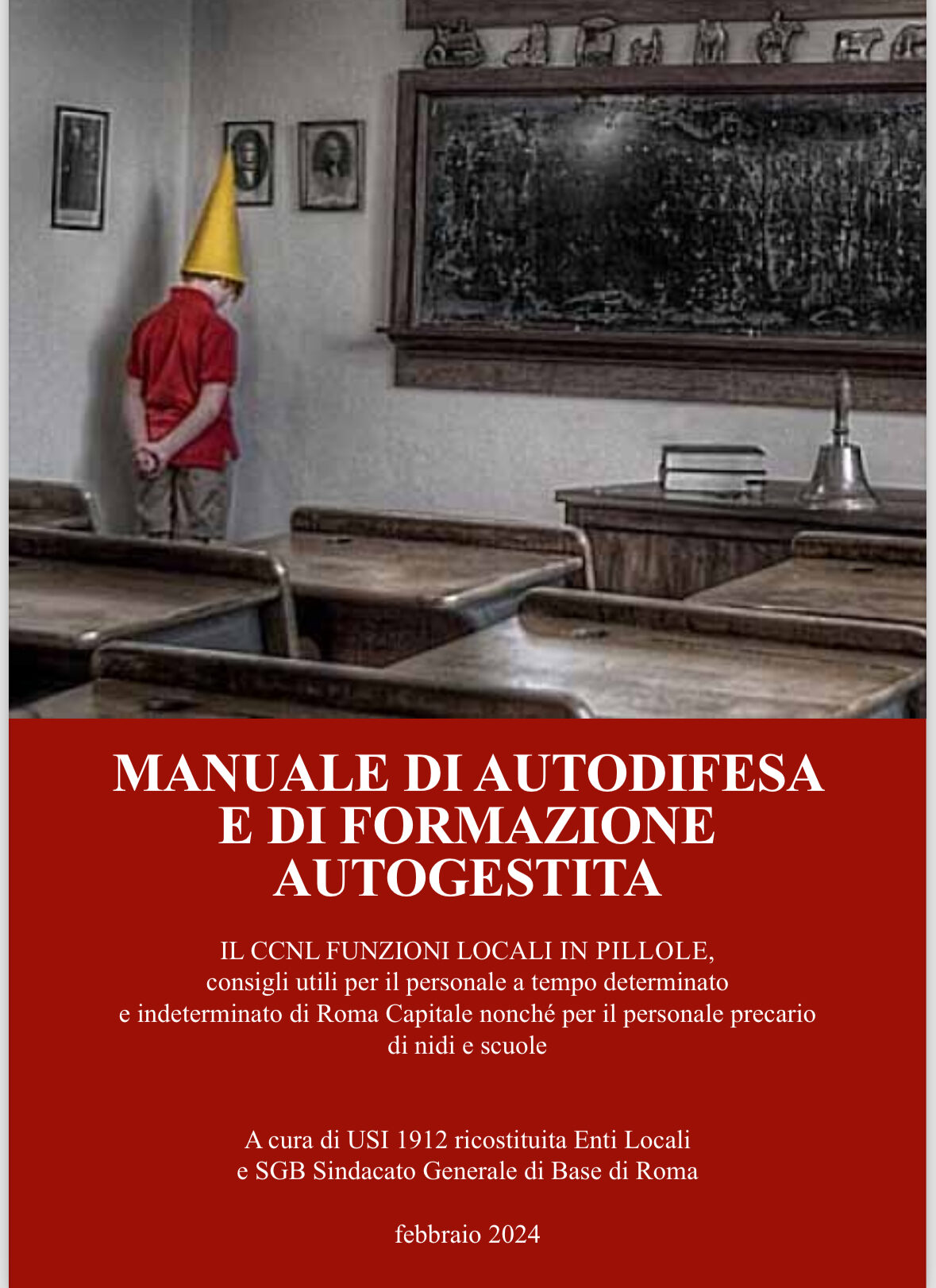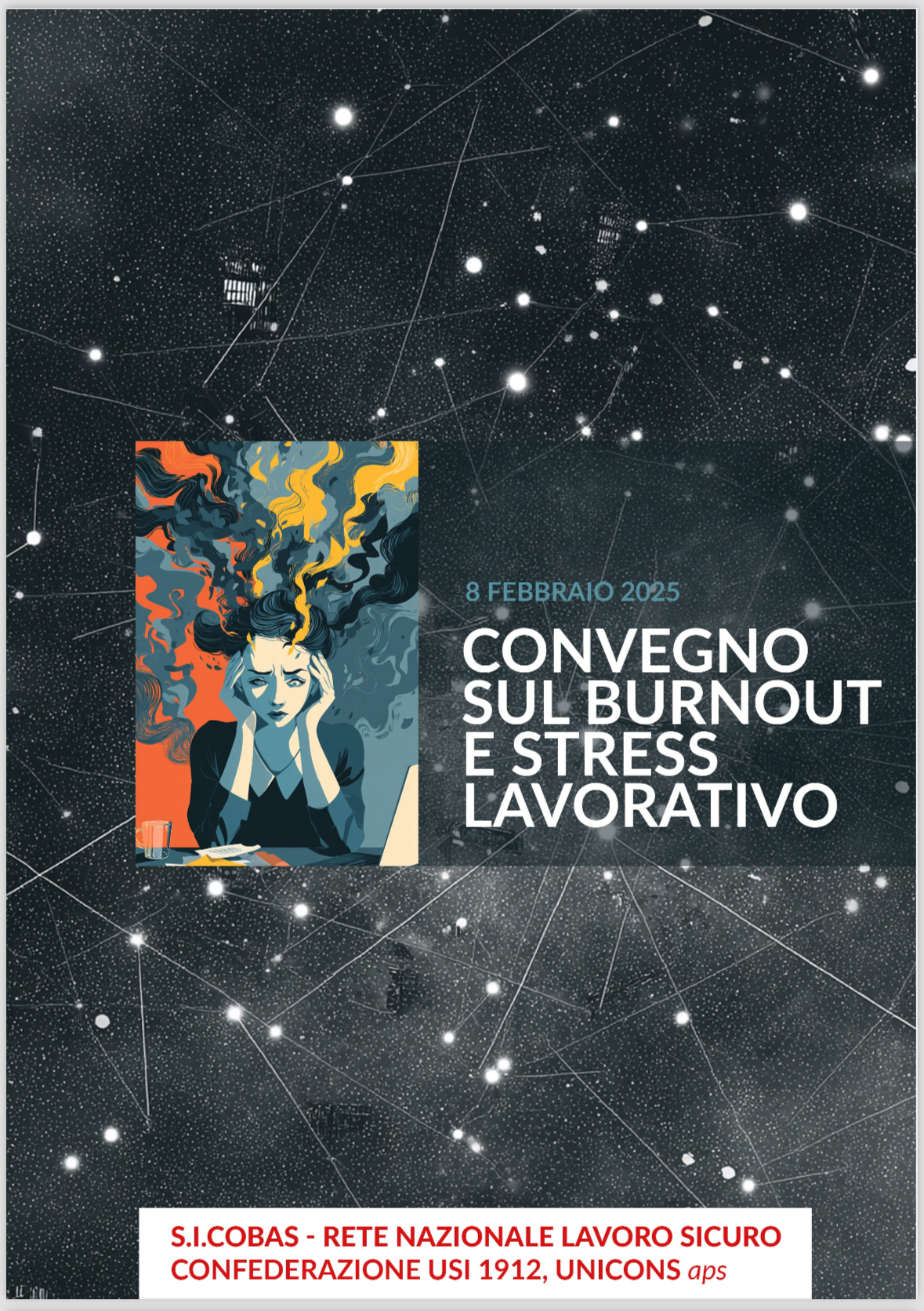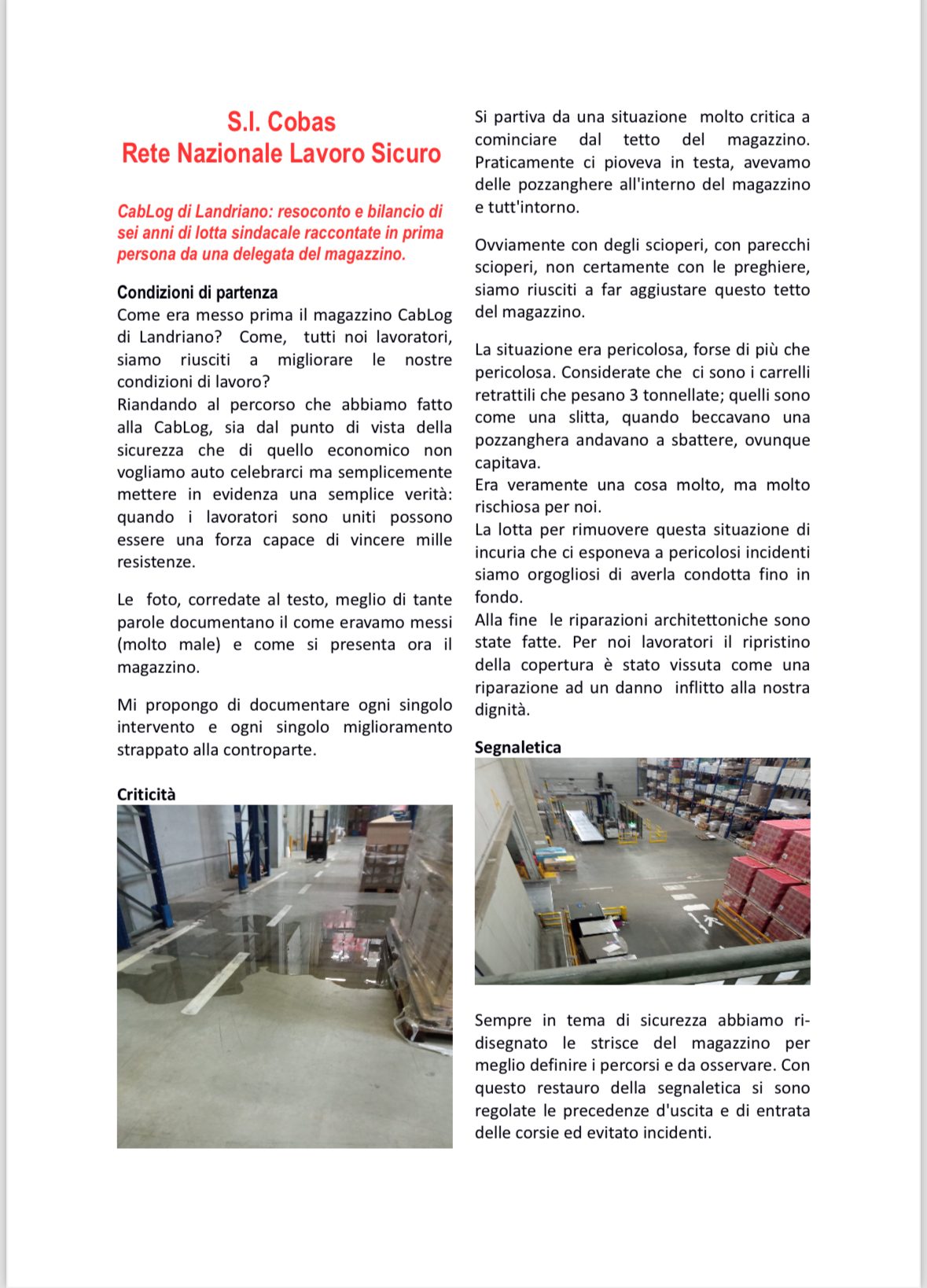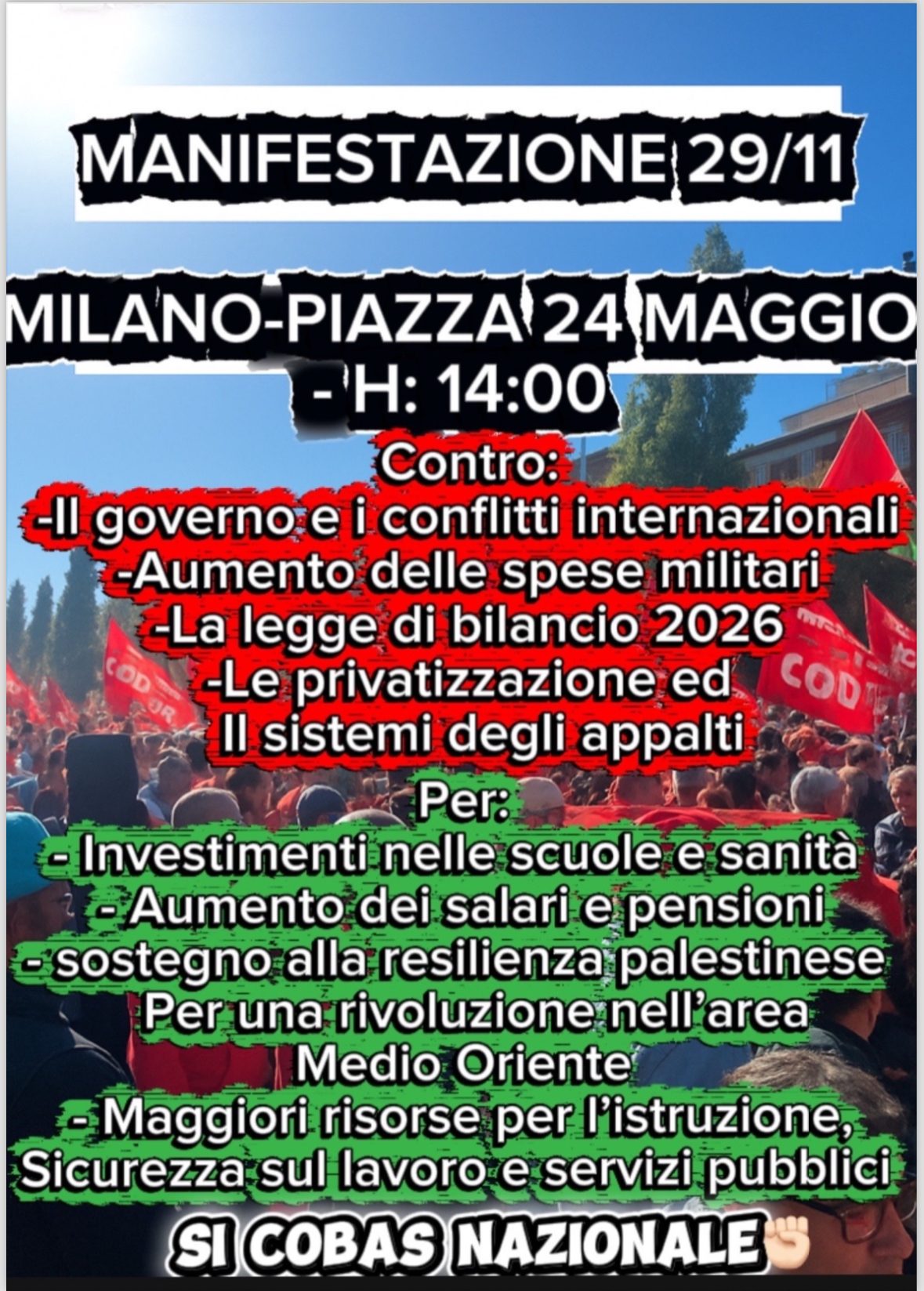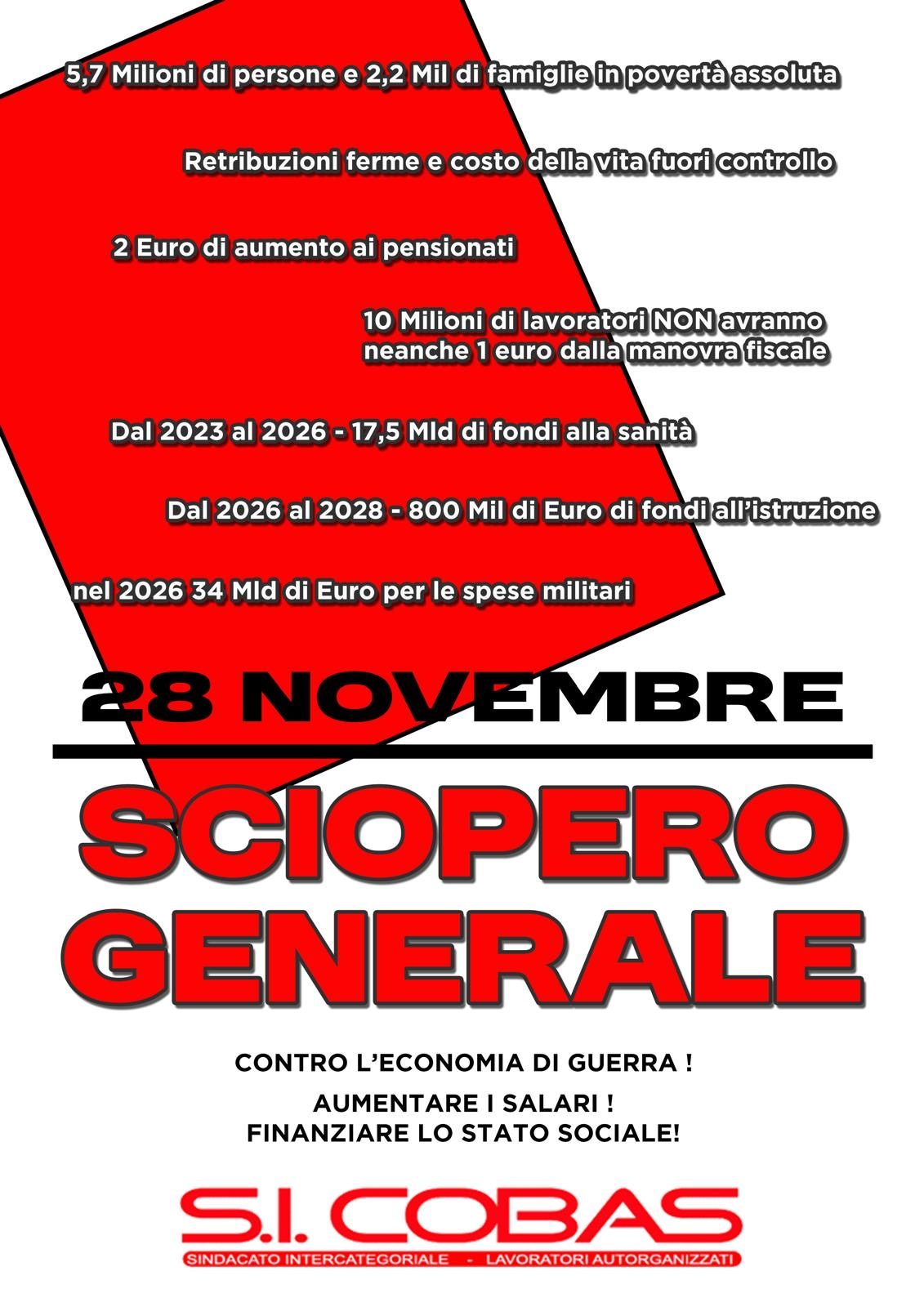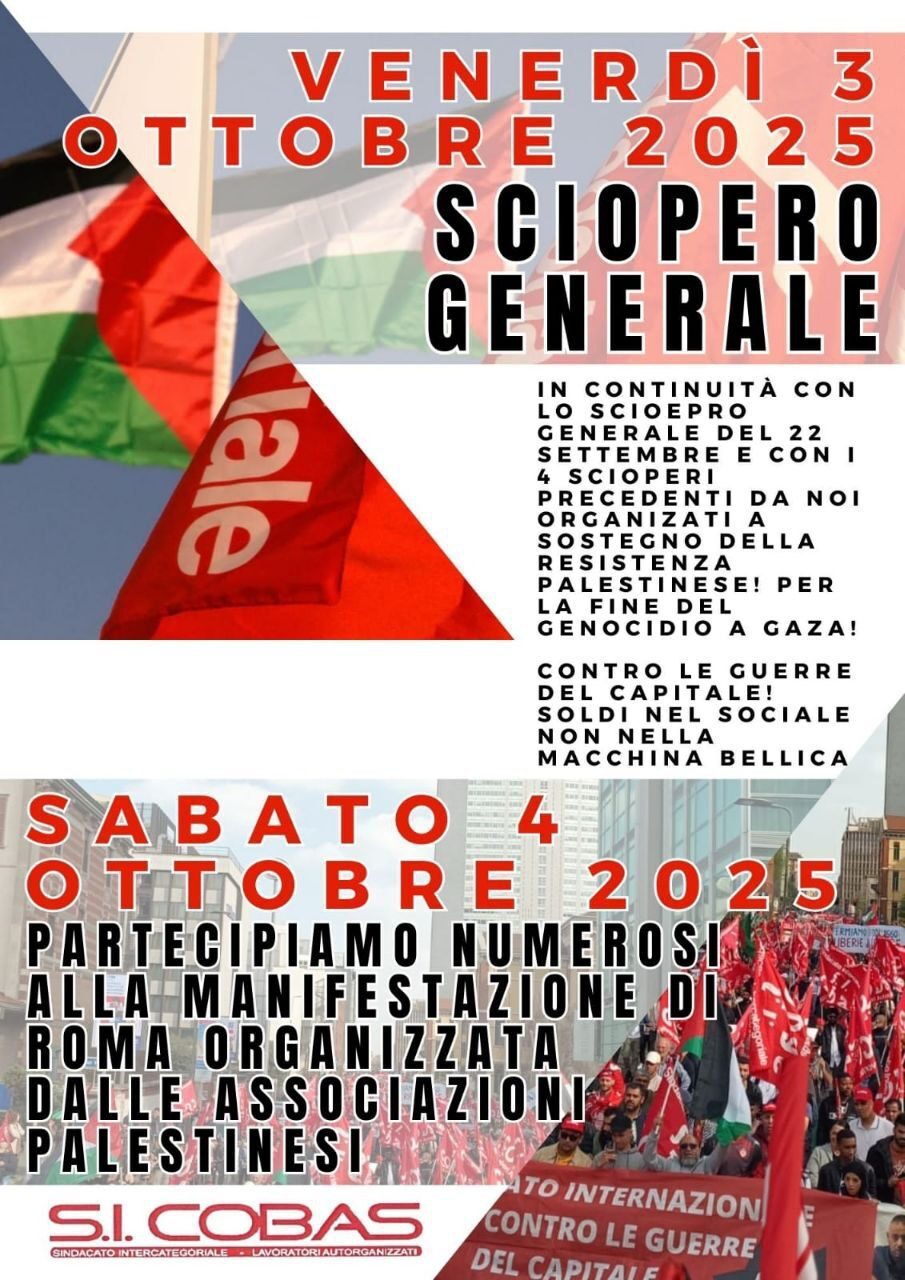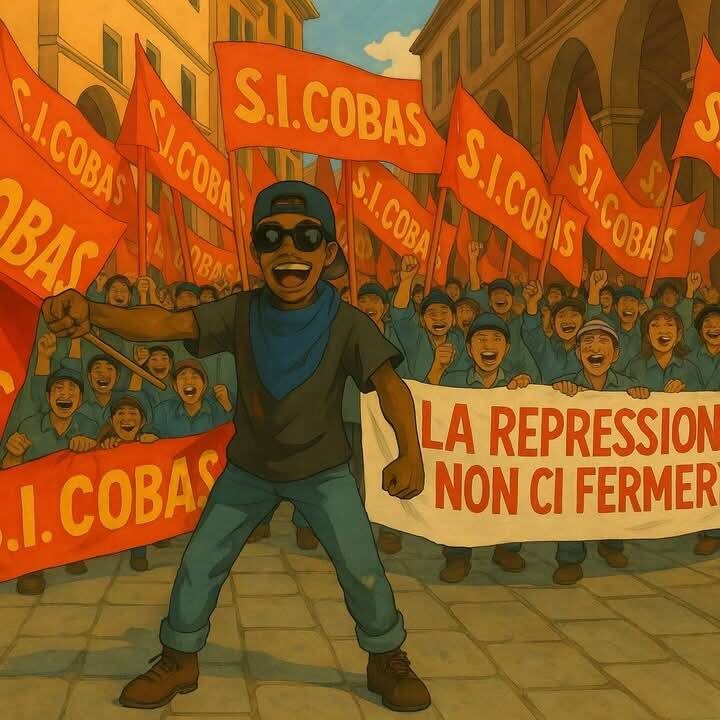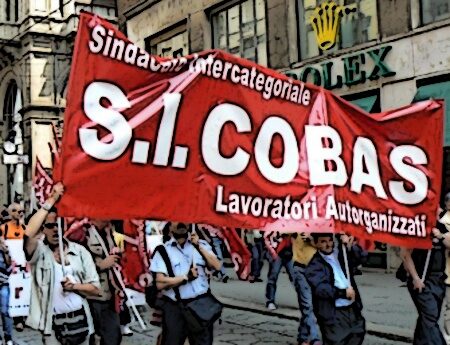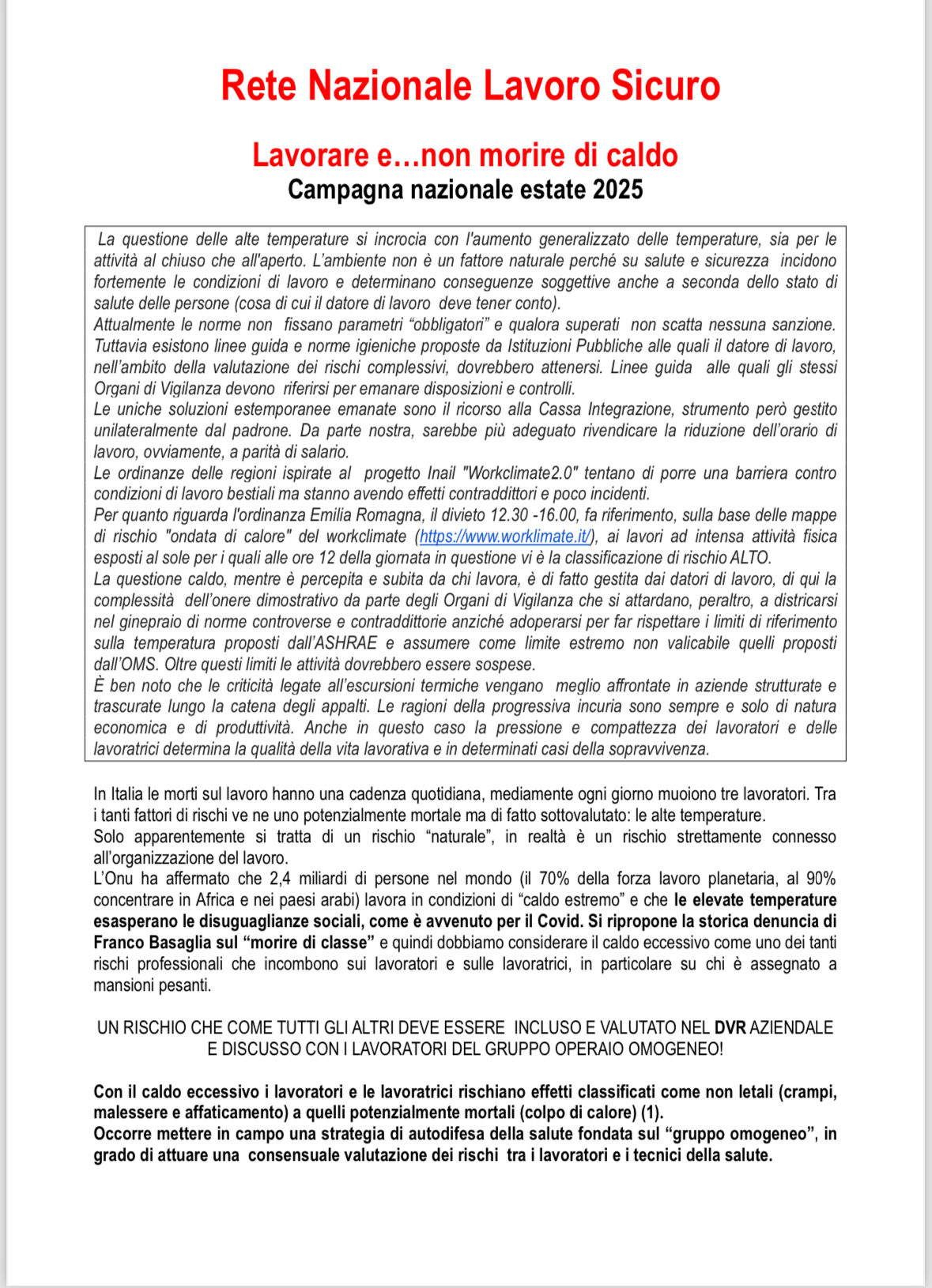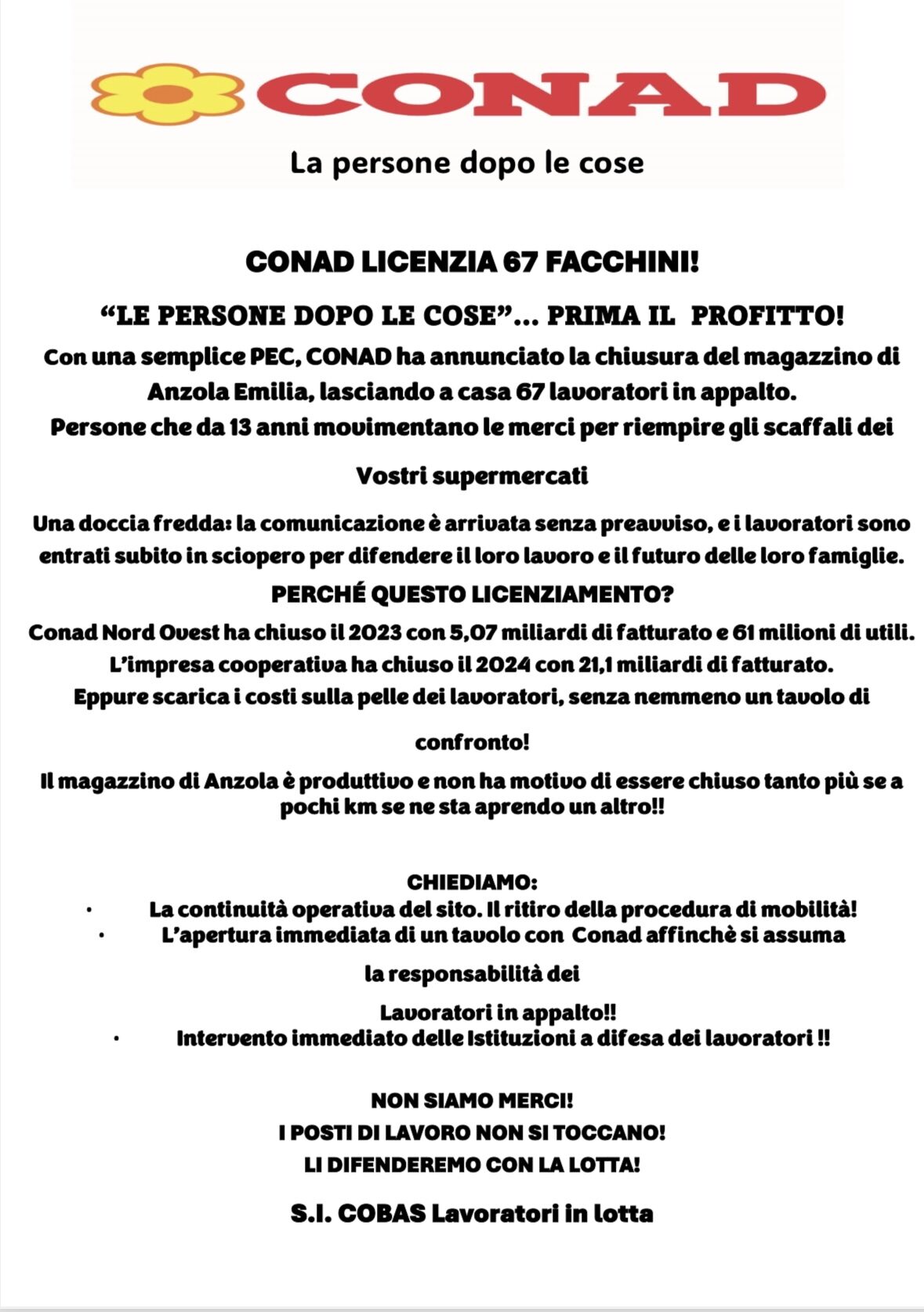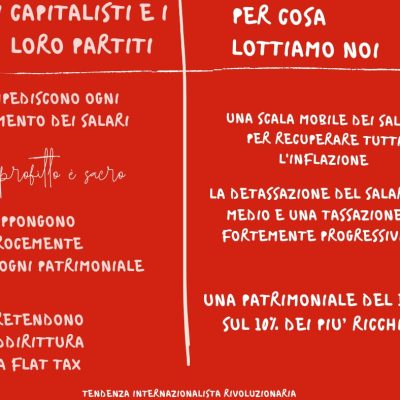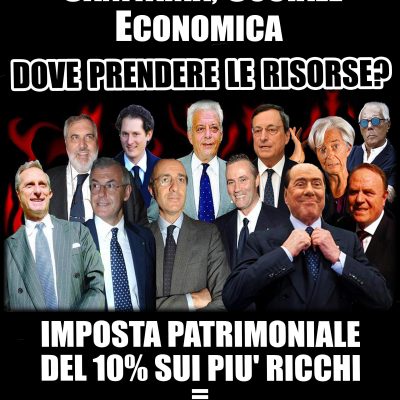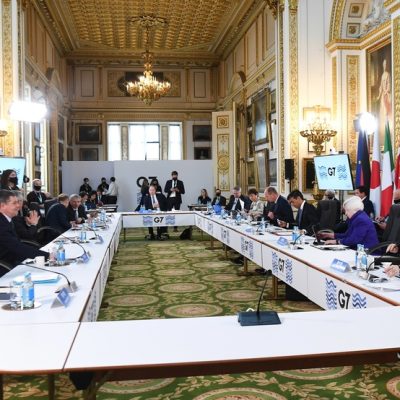No to public debt. Yes to a 10% wealth tax on the richest 10%.
Where to get the resources, and how to use them
These days, large numbers are flying around like confetti. They are not confetti, but bills falling due. Bills that all those who must work to live will be obliged to honor, if they do not react and fight organized to impose their immediate and prospective solution to the huge crisis in which we have fallen.
Take the latest official issue given by the Conte-2 government: 440 billion euros of new public debt to be added to the 2,443 billions as of January 2020. For the EU as a whole, we talk about many trillions of euros, as for the United States. Therefore, the Italian state has decided to increase immeasurably its debt with its internal and foreign creditors. Those are banks, insurance companies, investment funds, the richest 10% of the population made up of large and medium-large capitalists, managers, landlords, rentiers, crime bosses (it is estimated that they have 25% of Treasury bonds in their hands), high ministry bureaucrats, generals, show business and sports stars, descendants of noble families, etc. – in short, the crème of social parasitism, people accustomed to sucking the blood of wage workers in automatic, without even getting their mouths dirty.
The share of the state debt in the hands of wage workers is almost insignificant, if it is true that in 2018 the share held by households as a whole was only 5.4%.
The specific forms of this giant new debt have not yet been decided. Negotiations are underway with the other European states on the ESM (the state-rescue fund) and on other instruments, including the so-called Recovery Fund. A debate is underway on the issue of government bonds with 30 to 50 years’ maturities, which ensure the parasites we mentioned above a good annual interest rate, expected to grow over time, and are totally tax-free. However, which part of society will be forced to pay this debt has already been decided in the upper echelons: the working class (in a broad sense). Because, as Marx explained in his time, “the only part of the so-called national wealth that actually passes into the collective possession of modern peoples is their public debt”. It was true yesterday, and is even more true today that public debts have been multiplying, in Italy, in Europe, in the United States, all over the world – including in countries claiming to be socialist or progressive. When we say “to pay”, we mean the increase in the exploitation of the labor, necessary to repay interest and principal. Because – together with nature, never forget it! – it is live labor that is the source of value or, vulgarly said, of social wealth, and above all of the fabulous private assets accumulated by the creditors of the state.
This process of indebtedness deliberated by states, governments, the IMF, the ECB, is presented as inevitable and beneficial for everybody. Only in this way, it is argued, we can revive the economy, save jobs and go back to looking hopefully towards the future (see the rhetoric of the Italian President Mattarella). Furthermore, part of these funds would be used for layoffs and various forms of support for the poorest. What could be better?
We deny this narrative from A to Z, a drug passed off by the ruling class. And against the solution of big business we oppose our solution: a wealth tax of 10% on the richest 10% of the population. A claim that is an important part of a program of struggle centered on the urgent and immediate needs of the working class, aimed at hitting and overturning current healthcare, environmental and social reproduction policies, which have multiplied the lethal impact of the virus.
There is no doubt, in fact, that the first effect of the great economic crisis triggered by the health crisis will be a huge increase in unemployment, precariousness, poverty. Even today, even for those who have kept their job, there is often a delay in the payment of wages and/or redundancy benefits, there are tens of thousands of proletarian, working-class families thrown on the rocks by the death of a relative, by their inability to pay rents, mortgages, installments, insurance, university debt, by the ruin of their mom-and-pop businesses – all social phenomena that have made the specter of hunger reappear in many areas of Southern Italy, and have burdened the indebtedness of individuals and of the most disadvantaged families. To cover the most urgent needs of survival and protection of the life and dignity of large social strata (think of the quarantine wages and guaranteed wages for all unemployed), a huge mass of resources is needed.
An equally conspicuous amount is needed to implement a health policy of opposite sign to the policy criminally centered first and foremost on profit (and cost reduction), which in recent months has given a disastrous proof of itself. It is not just a matter of starting immediately an extraordinary plan of permanent staff hiring to restore the staff of the healthcare facilities, and fully absorb the wide range of precarious labor swelled in the last twenty years, while allowing a sharp reduction of often unsustainable workloads and working hours. Nor is it just a matter of equipping public health facilities (and incorporating private ones into them) so that they can complete (but we are not any close to this point, yet ) the eradication of the epidemic, and be prepared for the return of this epidemic in autumn, or the arrival of a new epidemic after some time. It is a question of giving way to a complete reversal of healthcare policies, putting primary prevention, the maximum development of health protection in the workplace through the sanitation of workplace environments and working conditions (in Italy, 4 workers are still dying every day due to “accidents”!), giving strength and means to occupational medicine, local and proximity medicine, hit to death by the “austerity” policies dictated by state creditors. It is also a matter of strengthening the system of family advice bureaus, chasing away the dismal “pro-life” associations from the local health centers. In short, it is a matter of concretely realizing the principle that even in the best of times has partly remained on paper: a truly universal and free healthcare for all – without any form of discrimination for immigrant communities. And, apart from the deserved kicks in the ass to Comunione e Liberazione (1) canvassers, the assertion of the health needs of the working class, including of course the healthcare personnel, has a cost that the owners of the public debt, that is the bosses, do not intend to pay – unless we force them through organized struggle, with a changed power relationship.
The devastating health crisis that – unsurprisingly – burst out especially in the Padania region, highlighted what had been denounced for decades by our front (e.g. G. Maccacaro and Medicina Democratica): environmental pollution is a “factory of diseases”. Although fraudulently trying to cover up this truth, it has come to the surface. And the true fight against environmental pollution is another of those tasks which, from a general plan of public transport by rail to a general plan of reforestation, from a systematic reclamation of waterways, lakes, lands, seas, to the productive restructuring of polluting plants, requires an extraordinary mobilization of resources for social purposes that a state increasingly in the hands of its own creditors, greedy for stratospheric gains in the short, medium and long term, cannot even conceive.
Not to mention the emergence of the special violence that the current mechanism of social reproduction imposes on women in normal times and especially in emergencies – between poorly paid extra-domestic work, caring for children and looking after the elderly, if all goes well. A condition that the extension of work from home could only aggravate, and which can begin to be overcome only with the radical overturning of the sexual and capitalist division of labor, starting with the “little”: a plan for construction on a large scale ladder of kindergartens and nests. Other huge resources! Not to mention what would be necessary for a real safety of the territories, for an authentic housing plan for the solution of the current growing housing emergency, and for a reworking of urban spaces for social (and not rent) purposes.
Where to get these resources from? Some, even in alternative unionism and the far left answer: making debts, going beyond the parameters of the Fiscal Compact, who cares. But you fools, don’t you realize that it is exactly what the Conte government and the EU are doing, and that you did not think possible? And don’t you know that state debt is a class debt, which entails the increasingly radical submission of state powers to the class of creditors? Others say, in these same milieus: we do not care where the state is going to get the necessary resources, it’s their business, the important thing is that they find them. A childish reasoning, since it is known where they plan to take them from (and for other purposes): from the wage fund of this and the two or three subsequent generations of proletarians.
Instead, we say: a 10% wealth tax on the richest 10% of the households – those who hold in their clutches 40% and more of the “national wealth”. The resulting figure is around 400 billion. For us, it is not a question of redistributing this wealth in a fairer way in order to have a “fairer” capitalist society. Much less is it a measure to restart the accumulation on the basis of higher internal consumption, creating additional demand “from below”. No. For us, this wealth tax aimed exclusively at the part of society most swollen with profits, property, financial income, is motivated by the health and economic emergency in which we have been precipitated by the capitalist class, by the capitalist system – we do not repeat here that the genesis of Covid-19 is perfectly capitalistic, we take it for granted. The class that lives off its labor does not have to pay for a catastrophe for which it bears no responsibility. The wealth tax, as we indicate, is an indispensable measure to satisfy the immediate vital needs of workers and the most deprived strata, and to claim – against capitalist interests – a health, environmental, social reproduction, housing policy really aimed at the general social needs for health and environmental reclamation, and at an effective support of female employment and social services which will first be challenged by the coming to a head of the crisis.
Of course, as mentioned, this political claim – that regards the whole working class and its relationship with the capitalist class, the state and the other classes – is only one piece of our program of struggle. Which is closely connected to a general political-and-trade union fight for the defense of wages and for the drastic and generalized reduction of working hours for equal pay to counter the aggression against direct wages and the fall in total wages on the one hand, the spread of unemployment on the other. In a systemic crisis such as the one that has opened up, the link between the struggle to defend the interests and strength of the workers and a counterattack is very close, since the hypothesis of a progressive and lasting improvement in the average condition of the mass of workers is objectively ruled out. On the contrary, this crisis can only be overcome in a capitalist sense with the catastrophic worsening of their condition. This is why the struggle for the 10% on the 10% wealth tax and for the objectives linked to it, while responding to immediate and unifying needs, is at the same time an integral part of the revolutionary perspective of overthrowing this system, of the historical expropriation of the expropriators.
It is no coincidence that a unanimous chorus arises from the class front opposite to ours.
Wealth tax? Never! It amounts to a proletarian expropriation! If anything, you have to cut taxes, introduce a 15 percent flat tax, grant money to companies, grant (eternal) tax peace with tax evaders of all ranks, etc. – that is, to swell even more the public debt. Buying the future is their motto: the future of those who work, of course. In the attack on the wealth tax, the right was immediately joined by the “5 Stars Movement” and the majority of the Democratic Party. Wealth tax never! The boss of bosses Mario Draghi explained why, and the discussion is over. At the most, mumbles someone from the Democratic Party, you could make a mini wealth tax on the … wealthier middle class, or as Messrs Amato and Monti, a “wealth tax” that also affects a good portion of the proletariat, and instead leave alone the large fortunes, the great financiers and capitalists. At most, some Cgil-Cisl-Uil, the official trade union executive murmurs (making it clear that even he does not believe it, either) let’s fight seriously against tax evasion – leaving once again safe the great fortunes built with tax avoidance, capital export, etc., and making the “organized labor movement” the complementary troops in the service of the great capitalists, those who tailor-make laws on themselves and hold government and parliament in their hands, to punish the small business people who often need to defraud the taxman in order to grow. That fight against tax evasion that even when it was carried out with a certain seriousness and (bourgeois) method, for example by the former Minister of Finance Mr. Vincenzo Visco, yielded only small change compared to the amounts indispensable in today’s dramatic emergency.
No! Wealth tax of 10% on the 10%. To prevent millions of proletarians from plunging into poverty, guaranteeing them the average worker’s wage and the coverage of the debts incurred, and being able to stay at home if the necessary workplace guarantees are not provided. Therefore, as a means of defense. But also as a means of attack. Attack on the class that made us fall into this disaster, to begin to remove the causes of this disaster, those that they want to prevent even from discussing; and which are already forging new viruses and new social crises. A means of attack, also ideologically: because the taboo that “the wealth of the rich, of the capitalists cannot be touched” must be broken, and also and above all to assert the need and the idea of another form of society, of another social system, where labor is no longer a commodity to be bought and sold and, if needed, be throw in the trash, and where nature is no longer a casket to be brutally plundered for profit.
That’s why we are smiling at the little lesson that some “sovereignity” economists wanted to give us: the wealth tax would be fair, they argue, but it cannot be implemented because the European Union protects the mobility of capital. Apart from the fact that the mobility of capital, and, especially for the sharks of “our home country”, the export of capital has been known for a long time before the birth of the EU, it is evident that ours is a proposal for mobilization, for anti-capitalist struggle, for struggling against capitalism. We are certainly not making a petition to the Conte-2 government to listen to us. It is a claim against the Conte government, against the banking system, against the industrialists’ association Confindustria, and their European and American partners that we are presenting to the proletarians and the impoverished classes, who will have to get moving if they want to save their skin and dignity. This is our interlocutor. Starting with the proletarians of the large factories who spontaneously refused to stay at work and the logistics proletarians organized with SI Cobas who fought in many warehouses to defend their health (having fatalities among them). And to go further, much further on.
Beyond national borders, of course. Because a claim like this, a program of struggle like ours, which includes among its fundamental points the reduction of military expenses and the withdrawal of Italian troops spread across the world to sow wars and devastation, also speaks to those who are in our same condition. The concentration and centralization of social wealth, the regressive tax systems – in which the richest pay less than wage workers – are certainly neither an Italian nor a European specificity. Also our defensive, offensive, political, ideological struggle is therefore an appeal to the unity of the proletarians from all over the world in the perspective of the common struggle for the disavowal, and cancellation of the internal and external public debt! In the revolutionary internationalist perspective of overcoming this decrepit mode of production and reproduction of social life that can only “advance” on its path through chains of disasters.
April 28th
Tendenza internazionalista rivoluzionaria
[Revolutionary Internationalist Tendency]
1 A Catholic business association with extensive interests in the healthcare business.




